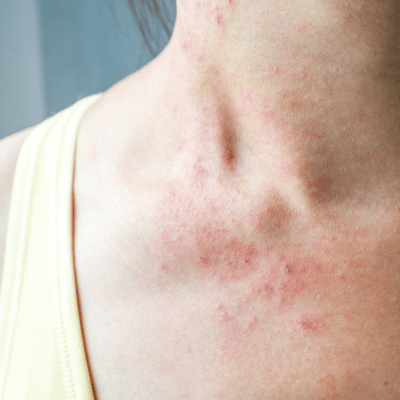
Eczema, also known as dermatitis, is a chronic skin condition that affects 1 in 10 people at some stage in their life. This frustrating condition refers to a group of skin conditions characterized by inflammation, redness, itching, and sometimes blistering or oozing, and can occur on the face and the body. There are several types of eczema, each with distinct causes, and symptoms, so it is important to understand your individual eczema to best be able to manage and treat your condition.
Here are some of the different types of eczema and how they can be treated:
Atopic Dermatitis
This is the most common type of eczema and often runs in families along with other allergic conditions like asthma and hay fever.
It typically appears as red, itchy patches on the face, neck, hands, and legs.
Treatment involves moisturizing the skin daily with a body moisturiser such as Ahava Mineral Body Lotion which is powered by nourishing and repairing healthy minerals, with the enlivening scent of green plum and sandalwood. Using mild soaps, avoiding triggers (like certain foods and irritants), and sometimes using prescription corticosteroid creams during flare-ups will also be beneficial. In severe cases, oral medications may be prescribed.

Contact Dermatitis
This type of eczema is triggered by contact with irritants or allergens like soaps, detergents, metals, fragrances, and certain plants.
It results in red, itchy, and sometimes blistering skin at the site of contact.
Treatment involves identifying and avoiding the trigger, using over-the-counter or prescription corticosteroid creams, and applying soothing lotions.

Nummular Eczema
This form of eczema appears as coin-shaped patches of irritated skin, often on the arms, legs, or torso.
It can be triggered by dry skin, cold weather, stress, or irritants.
Treatment includes moisturizing regularly, avoiding harsh soaps, using prescription corticosteroid creams, and taking antihistamines to alleviate itching.
Weleda Skin Food Body Moisturiser is deeply nourishing while providing intensive, long-lasting moisture. Easily absorbed, non-sticky and non-greasy formula that is suitable for daily use. Dermatologically tested, Free from synthetic preservatives, fragrances, colourants and raw materials from mineral oils, and Vegan friendly.
We love the hempdrop Passionfruit Hemp oil. For best results use daily either on irritated areas, or mix a couple drops into your daily body moisturiser.

Dyshidrotic Eczema
This type primarily affects the palms of the hands and soles of the feet, causing small, itchy blisters.
The exact cause is unclear, but it may be related to allergies or exposure to certain metals.
Treatment includes keeping the affected area dry, using corticosteroid creams, and in severe cases, phototherapy or immunosuppressive medications.
Seborrheic Dermatitis
This type commonly affects the scalp (resulting in dandruff), face, and chest.
It appears as red, scaly patches that can be itchy and sometimes oily.
Treatment involves using gentle cleansers, antifungal shampoos (for scalp involvement), and topical corticosteroids.
Try the CanGro Hero Scalp Brush to cleanse your scalp to promote hair growth, eliminate dandruff, and help with scalp troubles. Its smooth silicone bristles help exfoliate dead skin cells and impurities while stimulating blood flow for a healthier scalp.
Stasis Dermatitis
This type typically occurs in the lower legs due to poor circulation, often seen in people with venous insufficiency.
Symptoms include swelling, redness, and scaling of the skin.
Treatment focuses on improving circulation through elevation, compression stockings, and addressing underlying conditions.
It's important to consult a dermatologist for an accurate diagnosis and treatment plan tailored to your specific type of eczema and its severity. Treatment often involves a combination of lifestyle changes, moisturizing, avoiding triggers, and using topical or systemic medications as needed.





 Webential
Webential